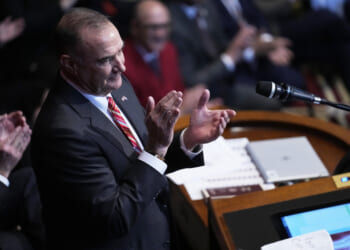Now maybe someone can tell John Eastman where to go to get his reputation back.
Eastman, you may recall, is the constitutional law expert and litigator in more than 200 cases before the Supreme Court whose life was wrecked by the Democrats for the high crime of having provided legal advice to Donald Trump in the wake of the rigged 2020 election. In addition to burying Eastman beneath malicious lawsuits, bar complaints, and subpoenas, and illegally snatching his cellphone, the Lawfare Left also ensured that Eastman was debanked — that is, he was denied access to financial services at Bank of America, where he’d been a customer for nearly 40 years, because of his politics. Plain and simple. Donald Trump and his family —including the first lady and his son Barron — got the same treatment from the big bankers and their regulators. So did countless peaceful January 6 tourists. So did cryptocurrency startups. So did firearm and ammunition dealers via the Obama administration’s diabolical “Operation Chokepoint” scheme, which began in 2013 and continued on until Trump ended it in 2017.
Don’t be fooled by the Democrats. Don’t let them tell you this coordinated weaponization of government via the private sector was meant to curtail fraud or money laundering or predatory lending. It was meant to destroy their political enemies. According to the Left, if you can’t beat opponents at the ballot box or in the marketplace of ideas, make their lives as miserable as possible by any means necessary.
That all this happened in 21st-century America speaks volumes about the threat of the federal Leviathan.
Regardless, though, it all ended five days ago when Trump signed an executive order titled “Guaranteeing Fair Banking for All Americans.” Its purpose reads in part:
Financial institutions have engaged in unacceptable practices to restrict law-abiding individuals’ and businesses’ access to financial services on the basis of political or religious beliefs or lawful business activities. Some financial institutions participated in Government-directed surveillance programs targeting persons participating in activities and causes commonly associated with conservatism and the political right following the events that occurred at or near the United States Capitol on January 6, 2021. The Federal Government suggested that such institutions flag individuals who made transactions related to companies like “Cabela’s” and “Bass Pro Shop” or who made peer-to-peer payments that involved terms like “Trump” or “MAGA,” even though there was no specific evidence tying those individuals to criminal conduct.
“As a result,” the EO continues, “individuals, their businesses, and their families have been subjected to debanking on the basis of their political affiliations, religious beliefs or lawful business activities, and have suffered frozen payrolls, debt and crushing interest, and other significant harms to their livelihoods, reputations, and financial well-being. Such practices are incompatible with a free society and the principle that the provision of banking services should be based on material, measurable, and justifiable risks.”
While the big banks are clearly the focus of our ire here, the process of debanking is more complicated than them just saying they don’t want someone’s business anymore. As The Wall Street Journal notes: “Starting in the mid-1990s, financial regulators started considering ‘reputational risk’ in grading banks for safety and soundness. If a bank provides services to an unsavory business, examiners could sanction it. During Operation Choke Point, Obama regulators pushed banks to cut off gun retailers and payday lenders by deeming them reputational risks.”
Indeed, what are we, Canada?
This doesn’t absolve Bank of America or the rest of those gutless big bankers, but it at least forces us to spread-load the opprobrium.
So Trump’s EO is the end of debanking, right? Wrong. It’s the temporary end of debanking. When Donald Trump’s term in office ends on January 20, 2029, all bets are off. Sure, the Democrats are plumbing rock-bottom in the polls, and the chances of a Republican successor to Trump look pretty good right now, but the party of Zohran Mamdani and Jasmine Crockett will be back one day, more vindictive than ever. Which means the only way to ensure that this vile and destructive practice — a practice that Republican Senator Tim Scott rightly calls “modern-day redlining” — never again rears its ugly head is through congressional legislation.
Scott, in fact, has introduced debanking legislation in the Senate, and Republican Andy Barr and Democrat Ritchie Torres have put forth a bipartisan companion bill in the House. Is there a bipartisan legislative solution in the works? Perhaps.
And I’ll bet that the Dealmaker-in-Chief — or perhaps Treasury Secretary Scott Bessent — will be arranging a meeting with Torres in short order, if he hasn’t already done so.
As the Journal’s editors put it, “Liberals are ridiculing Mr. Trump’s campaign against debanking as a ‘personal gripe,’ to quote the New York Times. But they have as much at stake as conservatives.”














